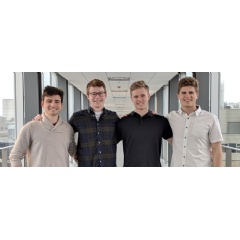University of Waterloo team to pitch for $1 million at United Nations
A team of recent University of Waterloo alumni is in the running for $1 million and business mentorship at the United Nations with a brand new startup it pivoted to in an English castle business accelerator last month.
Mitchell Catoen, Devon Copeland, David Ferris, and Rareș Topor-Gosman, who all graduated from Waterloo’s mechatronics engineering program last spring, are up against five other teams, whittled down from over 100,000, in the final leg of the 2019 Hult Prize challenge, the world’s largest student social entrepreneurship competition.
Team Phonic
“We were completely and utterly stunned to discover we were going to New York,” said Catoen. “There were so many teams at the castle that are already doing so much good and making an impact as well as generating revenues.”
Both Catoen and Copeland think the judges were impressed that the team was able to come up with an innovative, as well as disruptive, business concept halfway into their stay at the English castle incubator.
What is Phonic?: https://www.youtube.com/watch?v=oku9Cxie7zM&feature=youtu.be
They’ll pitch their company Phonic, a market research solution that will provide employment to youth, to an elite team of judges, including the president of Earth Day, the executive director of UNICEF, and actress-turned-entrepreneur Jessica Alba.
The $1 million cheque presentation will be made by former U.S. President Bill Clinton. Each year, Clinton comes up with the Hult Prize challenge, which is currently focused on youth unemployment.
The Waterloo team members’ business concept is entirely different from the one they developed while participating in a fourth-year social entrepreneurship course offered through the University’s Conrad School of Entrepreneurship and Business and took with them to the Hult Prize Startup Accelerator located in a 16th-century castle outside of London.
When the team arrived in England in mid-July, members were still focused on their original startup called Better Bail for America (BB4A), a solution to help prevent youth unemployment in the United States by enabling young, employed, first-time offenders on minor charges to access crowdfunded, interest-free bail.
After presenting BB4A on two consecutive “Pitch Fridays” to judges and the other 37 teams at the castle, the four team members came to the conclusion that while their idea had merit, they lacked the necessary legal background and faced a lot of political adversity to make it work.
“We felt it was important for us to acknowledge those challenges and to think realistically about if we were the right team to solve the problem,” said Copeland. “We ended up deciding to pivot to our new business.”
The idea behind Phonic stemmed, in part, from the problems the team experienced in trying to undertake market research for BB4A. Members found it difficult to have conversations with people who had gone through the bail system themselves or were trying to pay bail for friends.
Overnight, team members came up with a slide presentation and live demo supporting their new business venture that would pay youth anywhere in the world to conduct guided audio interviews on Phonic’s app. Through AI, meaningful data from responses would be extracted with insights shared on an intuitive dashboard with clients.
On the fifth and last Pitch Friday, the Waterloo team members found out they were moving on to New York. One of six finalists, Phonic is the only Canadian startup competing. Two years ago Epoch, a University of Waterloo team that developed a mobile marketplace to better connect refugees to the community, also made it into the last round.
( Press Release Image: https://photos.webwire.com/prmedia/7/246914/246914-1.jpg )
WebWireID246914
This news content was configured by WebWire editorial staff. Linking is permitted.
News Release Distribution and Press Release Distribution Services Provided by WebWire.

